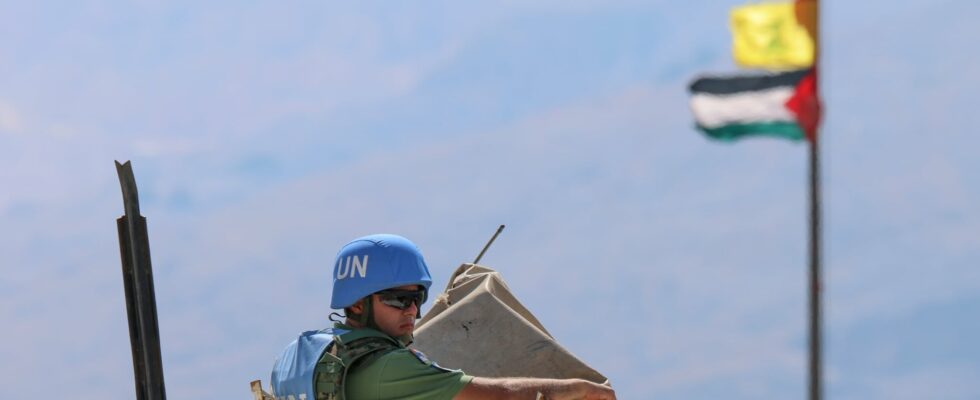Since Thursday October 10, Israel has been under fire from criticism. For good reason: its army, the Tsahal, fired several times on positions of the peacekeepers of the United Nations Interim Force in Lebanon (UNIFIL) in the south of the country, injuring four soldiers. L’Express takes stock.
What happened on Thursday and Friday?
On Thursday, two Indonesian peacekeepers were injured after an Israeli Merkava tank fired at an observation tower at UNIFIL headquarters in Naqoura. UN forces accused Israeli troops of “repeatedly” firing on its positions, reporting that they had “deliberately fired on the position’s cameras, rendering them inoperable” and “on a position where tripartite meetings were held regularly before this conflict.
The Israeli army, which has been carrying out ground incursions against Hezbollah in southern Lebanon since September 30, claimed to have fired on Thursday “next to” the UNIFIL headquarters after warning the staff. According to Agence France Presse, this raid targeted “the head of Hezbollah’s security apparatus Wafic Safa”.
UNIFIL announced on Friday that two other peacekeepers, this time Sri Lankan, had been injured near the border with Israel, saying that the Israeli army’s fire posed a “very great risk” for its soldiers. According to the UN, which has 10,000 men deployed in southern Lebanon, this HQ “suffered explosions for the second time in 48 hours” near an “observation tower”.
In addition, “Israeli tanks advanced” and “an Israeli army bulldozer brought down sections of a protective wall” from a UN position in the village of Labbouné, added UNIFIL.
Since October 2023, more than 2,100 people have been killed in Lebanon, including more than 1,200 since September 23, according to an AFP count based on official figures. The Lebanese government called on the UN on Friday to stop the fire “immediately” between Israel and Hezbollah, the day after Israeli strikes on Beirut, the deadliest on the capital since three weeks of war between the Israeli army and the movement pro Iranian.
How does Israel justify these attacks?
The Israeli army announced Friday that it was “conducting a thorough review at the highest level.” “The IDF has been informed that two UN peacekeepers were accidentally injured during fighting [l’armée israélienne] against Hezbollah in southern Lebanon,” said a military statement.
The Israeli military “expresses its deep concern over incidents of this type and is currently conducting a thorough review at the highest level of command to establish the details of what happened,” the text added. . The IDF then added that it had fired in the direction of a “threat” close to the UNIFIL position.
Israeli Prime Minister Benjamin Netanyahu called on Lebanon on Tuesday to “liberate” itself from Hezbollah, or risk suffering the same fate as Gaza. Citing an attempt by Hamas to rebuild its capabilities in the north of the Gaza Strip, the Israeli army has been surrounding Jabalia since Sunday and shelling the area.
Did the UN react?
The Secretary-General of the United Nations, Antonio Guterres, denounced Israeli fire targeting peacekeepers in Lebanon as a “violation of international humanitarian law”. “I condemn the fact that there was shooting against a United Nations site, injuring two peacekeepers, which constitutes a violation of international humanitarian law,” the leader declared to the press during a summit in Laos. “There was naturally a reaction from many parties in solidarity with the peacekeepers who were injured, and to make very clear to Israel that this incident is intolerable and cannot be repeated,” he added.
Lebanese Prime Minister Najib Mikati today called on the UN to adopt a resolution for an “immediate ceasefire” in the fighting between Israel and the Islamist movement Hezbollah, at war for three weeks. The Lebanese Prime Minister assured that his government was “committed to the full implementation of resolution 1701”, which stipulates the cessation of hostilities on both sides of the border and provides that only UN peacekeeping forces and the Lebanese army be deployed in southern Lebanon.
What are the other diplomatic reactions?
The French Ministry of Foreign Affairs announced this Friday that it had summoned the Israeli ambassador to France. “These attacks constitute serious violations of international law and must stop immediately,” denounced the Quai d’Orsay in a press release. “The Israeli authorities must explain themselves: France is therefore summoning, today, the Israeli ambassador to France to the Ministry of Europe and Foreign Affairs,” he added.
The United Kingdom is for its part “dismayed” by reports of Israeli fire against the UN force deployed in Lebanon (UNIFIL), a spokesperson for Prime Minister Keir Starmer said on Friday. “It is essential that peacekeepers and civilians are protected,” said the spokesperson, reiterating London’s call for “an immediate ceasefire”.
Spanish Prime Minister Pedro Sánchez called on the international community this Friday to no longer deliver weapons to Israel, deeming it necessary “not to contribute, in one way or another, to the escalation of violence” in Middle East. “It is urgent, in light of everything that is happening in the Middle East, that the international community stops exporting arms to the Israeli government,” declared the socialist leader after a meeting in Rome with Pope Francis.
